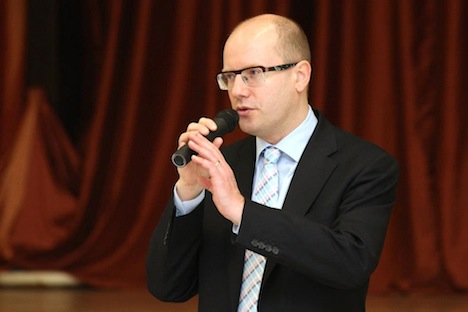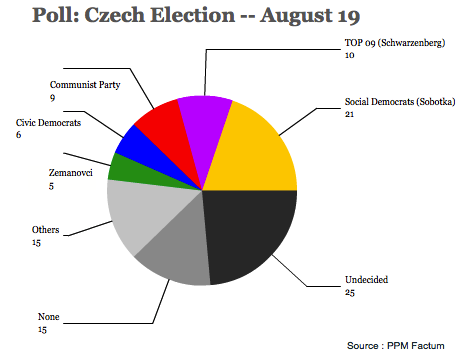In a widely anticipated move, the Czech parliament voted to dissolve its lower house yesterday, clearing the way for fresh elections in October and ending what had been a constitutional battle between president Miloš Zeman and his opponents since the collapse of former prime minister Petr Nečas over a corruption and surveillance scandal. ![]()
In a blow to Nečas’s Občanská demokratická strana (ODS, Civic Democratic Party), its one-time ally Tradice Odpovědnost Prosperita 09 or ‘TOP 09′ (Tradition Responsibility Prosperity 09), a liberal party led by former foreign minister Karel Schwarzenberg joined with the Czech Republic’s center-left parties to dissolve the 200-member Poslanecká sněmovna (Chamber of Deputies).
Zeman is likely to announce elections for October 25-26 and a formal date is expected by the end of the week.
Polls show that the Česká strana sociálně demokratická (ČSSD, Czech Social Democratic Party) holds a wide lead going into the elections, which means that its leader Bohuslav Sobotka (pictured above) is widely favored to become the next prime minister of the Czech Republic. The Social Democrats outpoll each of the Civic Democrats, TOP 09 and the Komunistická strana Čech a Moravy (KSČM, Communist Party of Bohemia and Moravia) by something like a 2:1 or 3:1 margin in most surveys of voter opinion.
Even before the Nečas government fell, however, the Civic Democrats had become extraordinarily unpopular due to the poor performance of the Czech economy and the government’s push to raise taxes and cut spending — a familiar story throughout much of Europe these days. The Social Democrats are expected to campaign on a platform of spending more funds on infrastructure instead of further budget cuts, and they may be able to do so now that the Czech economy appears to be moving from recession to growth in the second quarter of 2013. But because the Social Democrats have also committed to positioning the Czech Republic for membership in the eurozone by the end of the decade, their capacity for wide budget deficits will be constrained.
Here’s the most recent survey — an August 19 PPM Factum poll that understates Social Democrat support compared to most polls:
Sobotka, a former deputy prime minister and finance minister, has ruled out a formal governing coalition that will include the Czech Communists, but even Sobotka even concedes that a potential Social Democratic government would depend on the Communists for support for the first time since the end of the Cold War, which will result in tricky negotiations with the largely pro-EU Social Democrats and the eurosceptic Communists. But the high number of voters who remain undecided and support none of the major parties underlines the broad disillusionment among Czech voters for the entire political system.
Zeman initially appointed Jiří Rusnok as a caretaker prime minister in July, though Rusnok narrowly lost a vote of confidence earlier this month, leading to yesterday’s dissolution vote. Zeman’s decision is widely viewed as an attempt to expand the influence of the Czech presidency vis-à-vis the Czech parliament — Zeman became president earlier this year after the first direct presidential elections in Czech history, and he has argued his direct mandate entitles him to a more sweeping role. Despite the failure of the Rusnok government to win a confidence vote, Zeman has skillfully muscled his way to dominating Czech politics throughout the summer, though early elections hold risks for him as well.
Though Zeman easily took advantage of the collapse of the Civic Democrats, he faces a different and more difficult challenge with respect to the Social Democrats, a party he once led as prime minister from 1998 to 2002. But Zeman left the Social Democrats in 2007 and he now leads a small splinter group which literally calls itself the Zemanovci, or ‘Zeman’s people.’ But Zeman’s small party seems unlikely to win the 5% support necessary to enter the Chamber of Deputies, the threshold required under the Czech electoral system, which relies solely on proportional representation to determine the lower house’s composition.
It makes the Zeman-Sobotka relationship the most important in Czech politics right now.
Though Sobotka hails from the anti-Zeman wing of the Social Democrats and he initially favored early elections to a new caretaker government, pro-Zeman forces within his party, including deputy leader Michal Hašek, pressured Sobotka to support the Rusnok government. If Zeman is as successful as rolling Sobotka after the election, he could wind up dominating the Social Democrats from the presidential palace and therefore wielding more power to set the next Czech government’s agenda than even Sobotka.
That prospect is leading Schwarzenberg to run a campaign on a platform of defending parliamentary democracy:
“At first, we wanted to launch a European election campaign, but now the defence of parliamentary democracy is the issue. In fact, the republic is the issue. However, how comes that it should be me who is to defend the republican constitution?” said Schwarzenberg, head of one of the oldest Czech and Austrian aristocratic families.
Schwarzenberg emerged as the surprise runner-up to Zeman in the first round of the presidential campaign, winning 23.4% to Zeman’s 24.2% and far outpolling the previous frontrunner, statistician and former caretaker prime minister Jan Fischer. If there’s room for anyone to break out in the current environment, it’s Schwarzenberg. Although his party supported the Nečas government, Schwarzenberg is very much an independent voice on the Czech political scene, and his vote for early elections is one of several signs that he’s moving further away from the Civic Democrats as elections become imminent. Despite the fact that he spent four decades in Austria during the Cold War, he has strong ties to the anti-Soviet dissident movement led by the late former president Václav Havel.
In sum, the campaign boils down to this:
- The Civic Democrats are in shambles following the fall of the Nečas government, and they are likely headed to defeat under any circumstances.
- The chief center-right presence in the election will be Schwarzenberg, a wily and charismatic politician who is already casting the election in terms of defending parliamentary democracy against Zeman’s presidential encroachment.
- The Social Democrats are likely headed to victory, though TOP 09 or another party could potentially outfox them, given the unsettled state of Czech public opinion.
- Within the Social Democrats, there is an ongoing debate between pro-Zeman and anti-Zeman factions that will ultimately determine whether Sobotka or Zeman will drive government policy in the event of a Social Democrat win — and that will set an important precedent for presidential power in the Czech Republic in the future.
- The ability of the Social Democrats to form a government rests on the willingness of the Czech Communists to support their government.

